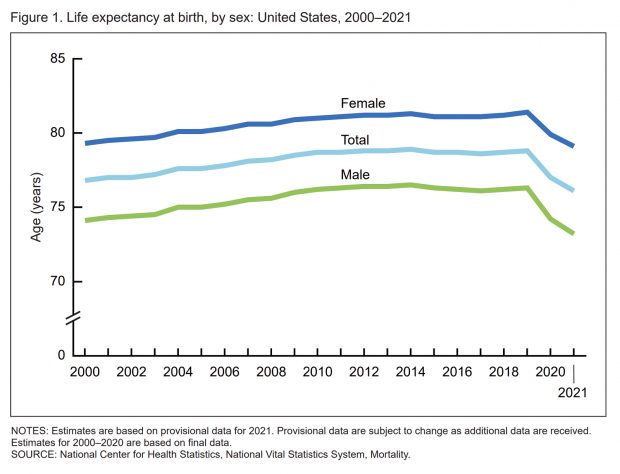Life expectancy at birth in the U.S. has fallen by nearly three years since the beginning of the Covid-19 pandemic, according to new provisional data from the Centers for Disease Control.
In 2019, before the pandemic began, life expectancy in the U.S. was 78 years and 10 months. In 2020, it fell to 77 years, due largely to deaths from Covid-19. In 2021, life expectancy fell for a second consecutive year, to 76 years and 1 month – about the same level it was a quarter century earlier.
Interestingly, only half of the loss in life expectancy in 2021 can be attributed to Covid, even though the death rate from the virus was higher in 2021 than in 2020. Other contributing factors include drug overdoses, heart disease and suicide – all of which had been weighing on life expectancy before the pandemic began. Drug overdoses hit a record high in 2021, killing about 109,000 people.
“It’s a dismal situation,” University of Pennsylvania demographer Sam Preston told the Associated Press. “It was bad before and it’s gotten worse.”
Unusually large decline: Life expectancy rose for decades in the U.S. during much of the 20th century, although the annual increase was typically small, measured in fractions of a year. The decrease recorded in 2020 and 2021, by contrast, was extremely unusual, and the largest change in life expectancy in nearly 100 years.
The decline could have been even worse, too. Death rates from influenza and pneumonia decreased during the pandemic, and if they had been more typical of the pre-pandemic era, the drop in life expectancy would have been even larger.
Some groups worse off than others: Americans have fared worse than citizens in most other high-income countries, the great majority of which saw a rebound in life expectancy in 2021 following a Covid-driven decline in 2020.
“None of them experienced a continuing fall in life expectancy like the U.S. did, and a good number of them saw life expectancy start inching back to normal,” Dr. Steven Woolf, director emeritus of the Center on Society and Health at Virginia Commonwealth University, told The New York Times. Those countries vaccinated a higher percentage of their populations and took additional steps, such as widespread mask-wearing, that reduced death rates. “The U.S. is clearly an outlier,” Woolf said.
Within the U.S., some groups saw larger declines than others. Native Americans and Alaskan Natives were hit particularly hard, with average life expectancy dropping by four years just in 2020, and 6.6 years overall. Life expectancy now stands at 65 for that group, about the level recorded for all Americans in 1944 during World War II. Covid complicated long-standing health issues among native populations, including diabetes and a lack of access to health care.
Black Americas were also strongly affected, seeing a four-year drop in life expectancy from 2019 to 2021, to 70.8 years. White Americans saw a smaller decline of 2.4 years during the same period, resulting in a life expectancy of 76.4 years in 2021.




